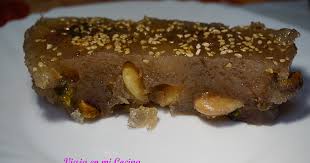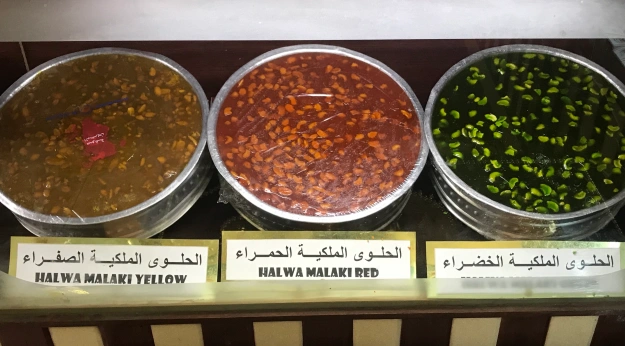The Heart of Bahrain’s Sweet Tradition
Every culture has its signature delicacy, a sweet that carries memories, traditions, and emotions within every bite. For Bahrain, that sweet treasure is halwa, a dessert that has become a symbol of celebration, hospitality, and heritage. Known for its rich texture, vibrant color, and delicate blend of flavors, halwa is more than just a sweet it is a story passed down through generations, carefully preserved to keep Bahrain’s identity alive. When someone in Bahrain offers halwa, they are not simply serving dessert; they are offering a piece of history and love.
Origins Rooted in Generations
Bahrain’s halwa is believed to have originated centuries ago, inspired by trade, cultural exchanges, and the creative spirit of local families. It was perfected in Bahraini households where mothers and grandmothers spent hours preparing it in large pots, stirring patiently until the mixture transformed into the shiny, chewy delicacy everyone knows today. Over time, halwa became an essential part of religious festivals, weddings, family gatherings, and national celebrations. Its preparation became a skill that families guarded with pride, ensuring the methods, ingredients, and secrets of flavor remained within the lineage.
The Ingredients That Make Magic
At first glance, halwa may look like a simple sweet. But its charm lies in the careful balance of ingredients that transform into something extraordinary. The traditional Bahraini halwa usually contains sugar, starch, ghee, rose water, saffron, nuts, and cardamom. Each of these ingredients has a purpose: sugar provides sweetness, starch gives it the distinct texture, ghee enriches it with smoothness, and rose water infuses a floral fragrance that lingers long after a bite. Saffron, often called the king of spices, gives halwa its golden glow, while cardamom brings a touch of warmth. Roasted nuts like almonds, pistachios, or cashews add crunch, making every spoonful a perfect harmony of softness and crispness.

The Traditional Method of Preparation
The making of halwa is an art that demands patience, strength, and precision. Traditionally, it begins with mixing sugar and starch with water in a large pot, often placed over a wood fire. This mixture is stirred continuously, sometimes for hours, to prevent lumps and achieve the perfect consistency. Ghee is slowly added to keep the texture smooth, while saffron and rose water are introduced to enrich the flavor. The mixture thickens gradually, becoming sticky and glossy, before nuts are added as a final touch. The entire process is physically demanding, as the mixture requires constant stirring to avoid burning. Yet, this hard work is what gives halwa its unique character an effort that turns simple ingredients into a dessert of love and pride.
A Family and Community Affair
Halwa preparation in Bahrain is not just about cooking; it is a communal experience. Families come together during special occasions, with elders guiding the younger generation in the traditional methods. Large batches are often prepared for weddings or religious celebrations, with neighbors and relatives gathering to share the joy of making and eating halwa. It is in these moments that halwa becomes more than food it becomes a symbol of unity, a reminder that traditions live strongest when shared.
Variations Across Bahrain
Though the core recipe remains the same, halwa in Bahrain has evolved into several variations to suit different tastes. Some versions are softer and lighter, while others are denser with extra nuts or flavors. Certain families add their own special touches, like saffron-rich versions with a deep golden hue, or halwa with dried fruits for added sweetness. In recent times, modern interpretations have emerged, combining traditional halwa with new flavors such as chocolate or coffee. These innovations keep the dessert relevant for younger generations, while still honoring the original recipe.
The Role of Halwa in Celebrations
In Bahrain, no celebration is complete without halwa. Whether it is Eid, a wedding, or a national holiday, halwa is served as a gesture of happiness and generosity. It is often presented in beautifully decorated boxes or bowls, gifted to relatives, friends, and guests. During religious festivals, halwa is shared after prayers, creating a sense of togetherness and joy. For many families, preparing halwa is an essential ritual that marks the beginning of festivities, filling homes with its fragrant aroma and lively spirit.
Halwa as a Symbol of Hospitality
Hospitality is a cornerstone of Bahraini culture, and halwa plays a central role in it. Guests visiting Bahraini homes are often welcomed with coffee and a serving of halwa, symbolizing warmth and respect. Offering halwa to guests is more than tradition it is a reflection of the country’s values of kindness, generosity, and pride in its heritage. The sight of halwa on the table instantly conveys a message: you are honored, respected, and cherished here.
Passing Down the Tradition
One of the most remarkable aspects of Bahraini halwa is how its making is passed from generation to generation. Children often watch their elders carefully prepare the sweet, learning not only the recipe but also the patience and dedication behind it. Many families treat halwa-making as a legacy, one that connects them to their ancestors. As modern lifestyles change, this tradition continues to serve as a bridge between the past and present, reminding Bahrainis of their roots.
Halwa Shops and Artisans
While many families prepare halwa at home, Bahrain also has iconic shops and artisans dedicated to perfecting this sweet craft. These shops are often family-run businesses that have been around for decades, attracting locals and tourists alike. The artisans work with the same passion and dedication as their ancestors, producing halwa in large batches for festivals, weddings, and everyday indulgence. The experience of visiting a halwa shop is unique you can see the steaming pots, smell the floral aroma, and watch as the mixture transforms into the glossy dessert.
Halwa and National Identity
For Bahrain, halwa is more than food; it is part of the national identity. It represents endurance, creativity, and togetherness. Just as the recipe requires time and patience, so too does the journey of Bahrain as a nation steady, resilient, and flavored with unity. In every piece of halwa, there is a reminder of where the people come from, and the traditions that continue to guide their future. It has become a symbol of cultural pride, one that Bahrainis love to share with the world.
Modern Innovations and Global Appeal
As the world becomes more connected, Bahraini halwa has found admirers beyond its borders. Tourists visiting the country often bring back halwa as souvenirs, spreading its reputation far and wide. Modern packaging and innovative flavors have made it appealing to international audiences while retaining its authenticity. Today, halwa stands not only as a local treasure but also as a global ambassador of Bahraini culture. This balance of tradition and innovation ensures that halwa will continue to thrive for generations to come.
Emotional Connection with Halwa
Beyond its taste and texture, halwa holds emotional value for Bahrainis. For many, it carries the memory of childhood, of sitting with family during celebrations, of watching elders stir the pot with care, and of savoring the first bite of the sweet, sticky delight. It is a reminder of family ties, traditions, and the joy of sharing. Halwa is not just something to eat it is something to feel, to remember, and to cherish.

The Cultural Symbolism of Halwa
Every culture has symbols that represent its spirit, and in Bahrain, halwa is one of them. Its glossy golden appearance symbolizes prosperity, its sweetness represents happiness, and its preparation reflects patience and dedication. Sharing halwa conveys goodwill, while making it connects people to their heritage. It is rare for a dessert to carry such deep symbolism, but in Bahrain, halwa is woven into the cultural fabric in a way that few other foods are.
Halwa in Today’s Bahrain
In modern Bahrain, halwa continues to play an important role. From traditional gatherings to upscale restaurants, it holds a special place in the culinary scene. While many young people enjoy experimenting with global desserts, halwa remains irreplaceable because of the values it carries. It is both a comfort food and a cultural symbol, bridging generations and connecting modern life with ancestral traditions.
The Effort Behind Every Bite
What makes halwa extraordinary is the effort behind it. The hours of stirring, the precision of timing, the balance of ingredients each detail matters. Every bite of halwa represents dedication and care, something that cannot be replicated by machines alone. It is this human touch that makes halwa more than a dessert. It is an offering of time, love, and tradition, which is why its place in Bahraini life remains unmatched.
Looking Ahead: Preserving the Sweet Tradition
As Bahrain continues to grow and modernize, preserving halwa-making becomes more important than ever. Families, artisans, and cultural institutions are ensuring that the younger generations learn and appreciate this tradition. By doing so, Bahrain safeguards not just a recipe, but a way of life. The future of halwa is bright, as it continues to evolve while staying true to its essence a sweet that reflects the nation’s soul.
Conclusion: A Sweet That Defines a Nation
Halwa is not just Bahrain’s dessert; it is its heart. It is a delicacy that speaks of patience, dedication, and love. It connects families, brings joy to celebrations, welcomes guests with warmth, and preserves history with every spoonful. For Bahrain, halwa is more than tradition it is identity. And as long as people continue to stir the pot, pass down the recipe, and share its sweetness, Bahrain’s halwa will remain a timeless symbol of pride and heritage.
Do follow Gulf Magazine on Instagram.
Also Read – Traditional Bahraini Breakfast: A Delicious Cultural Journey



